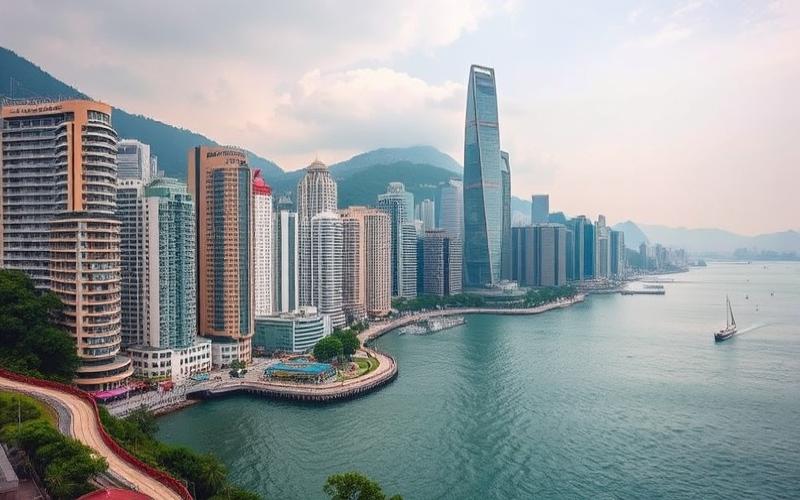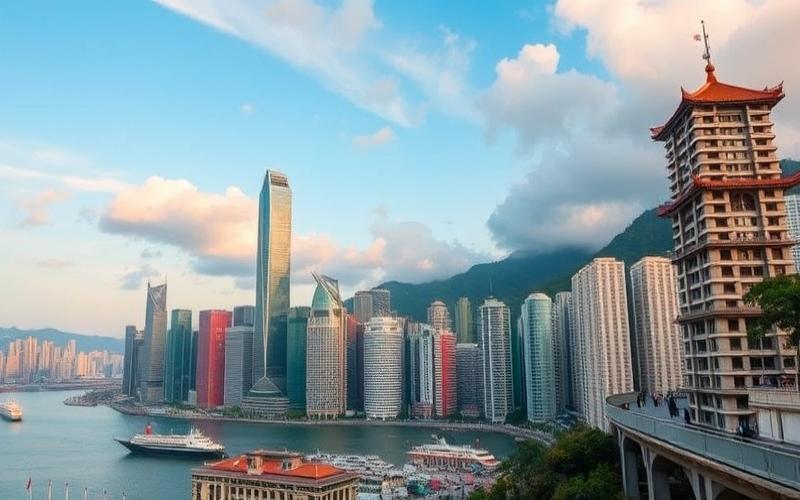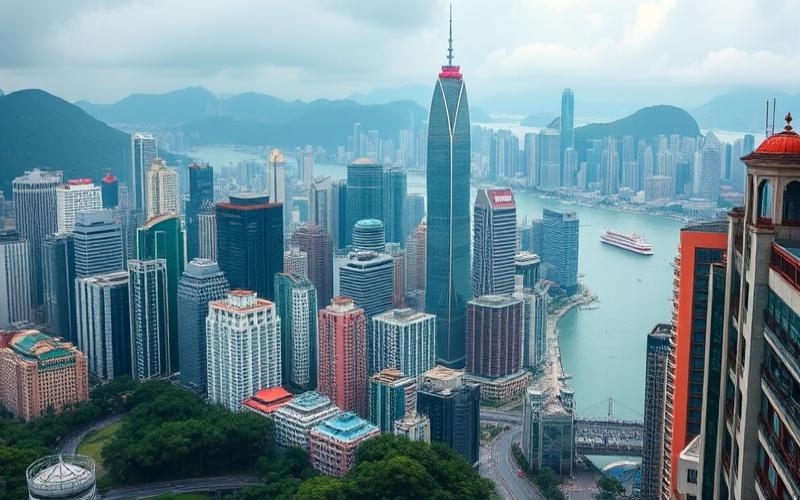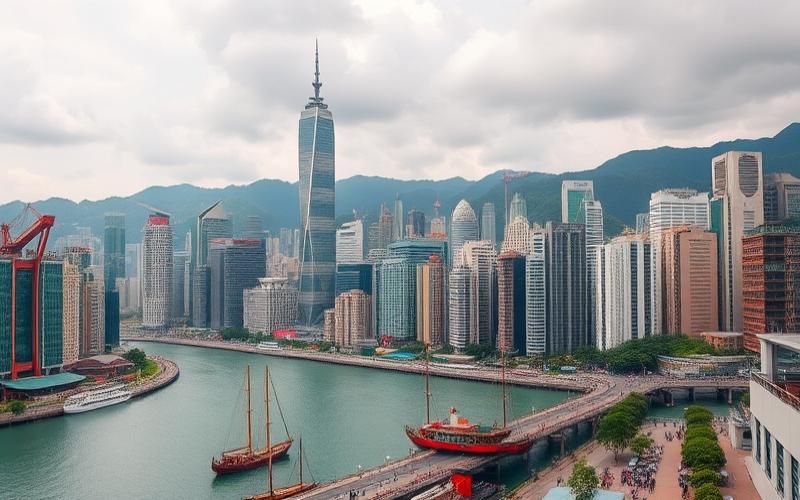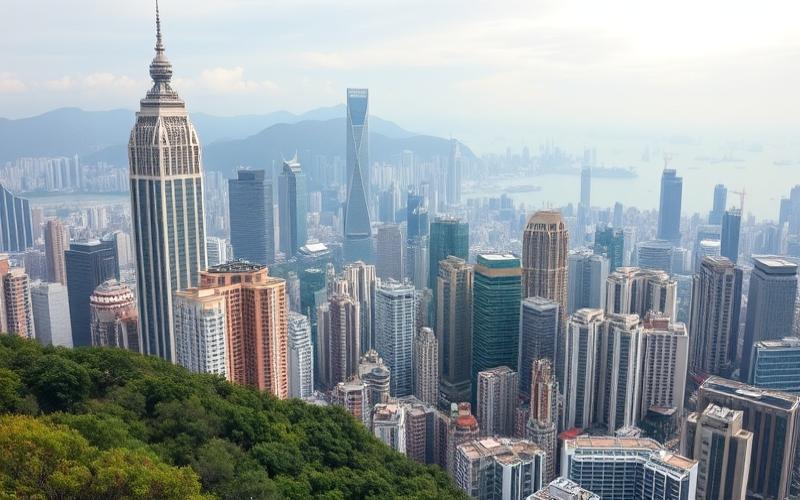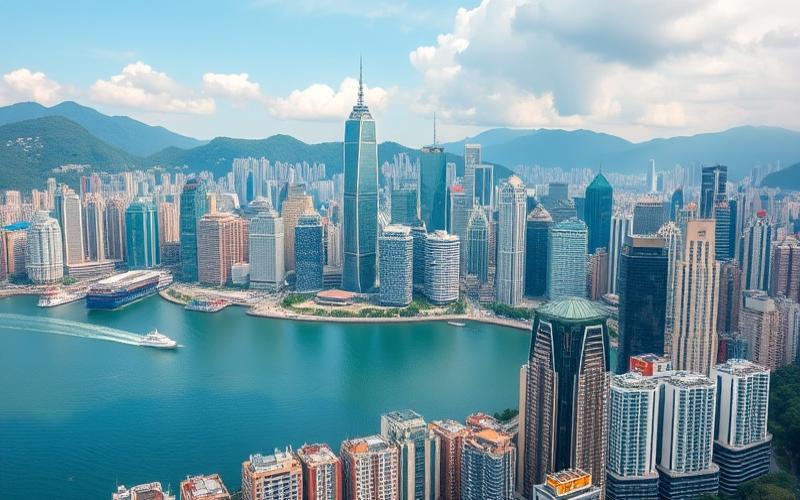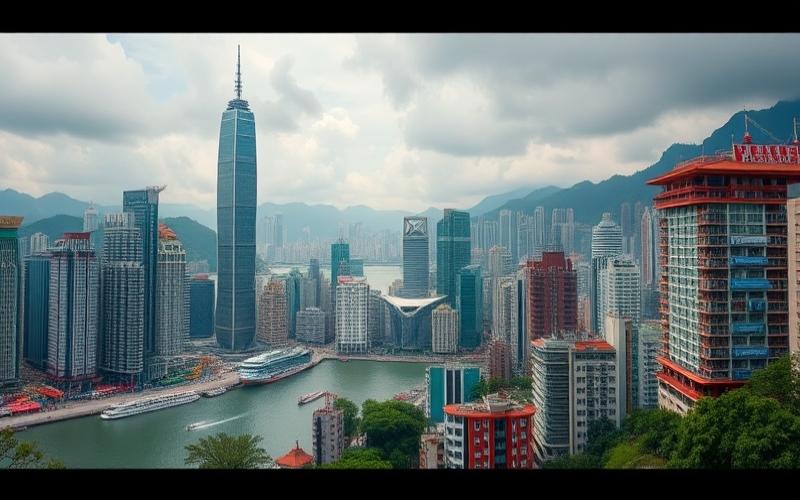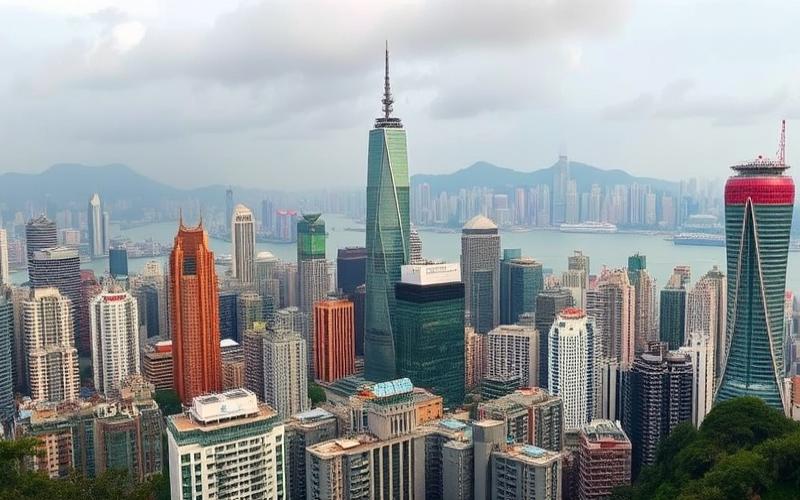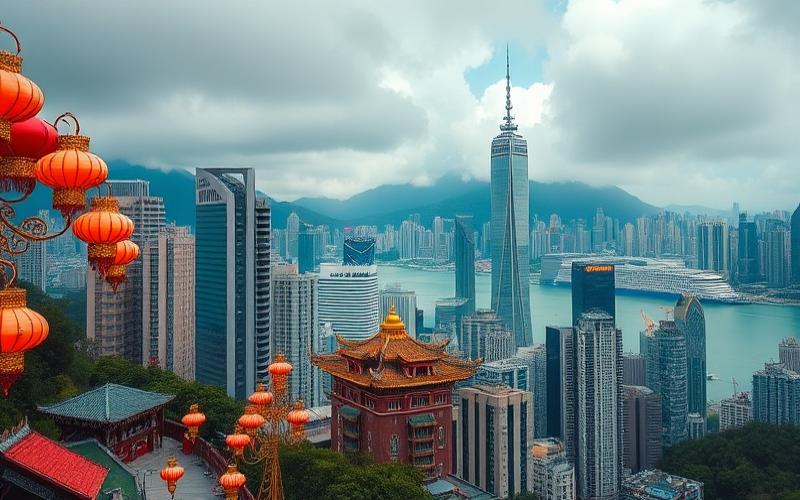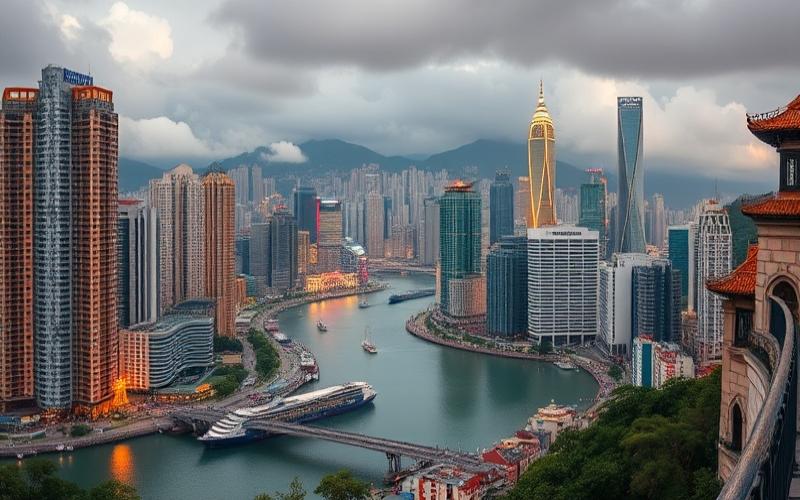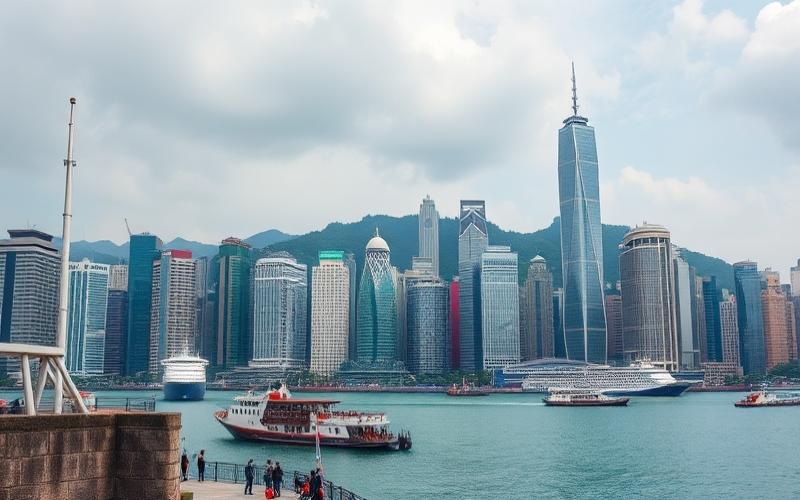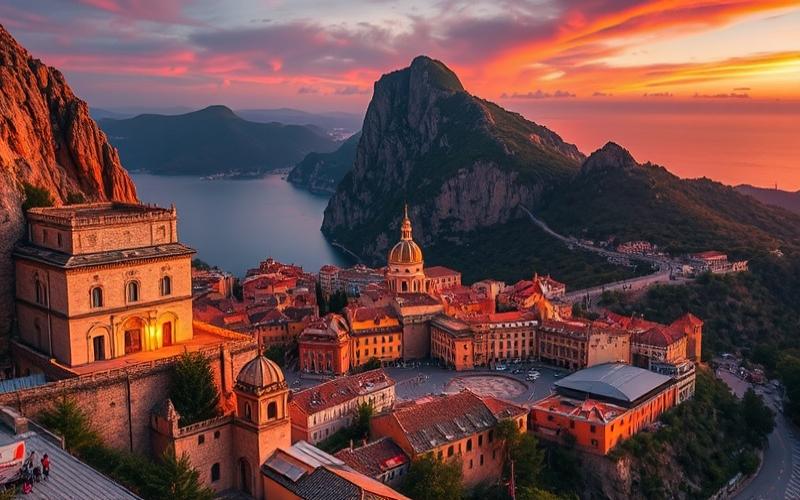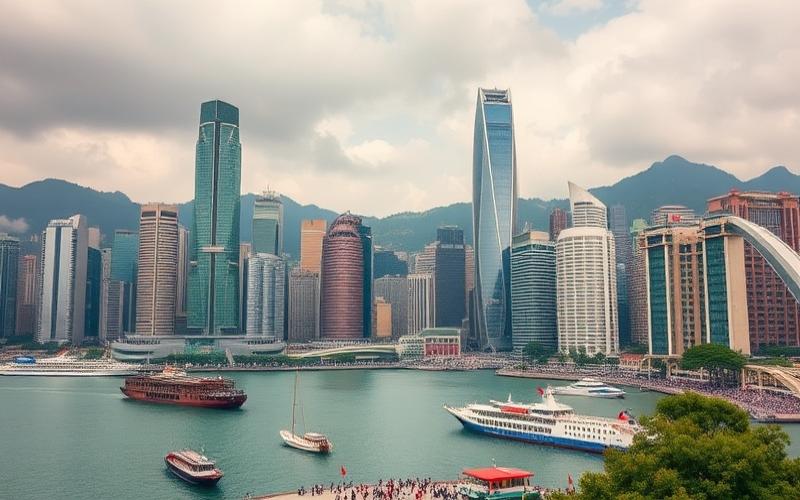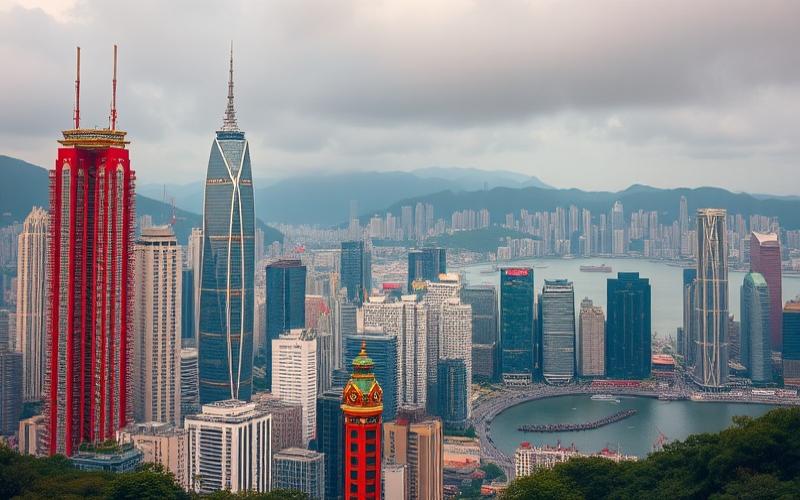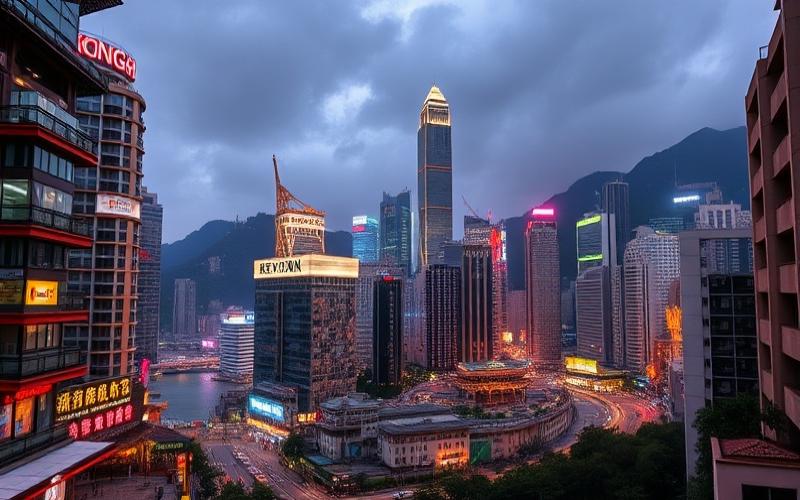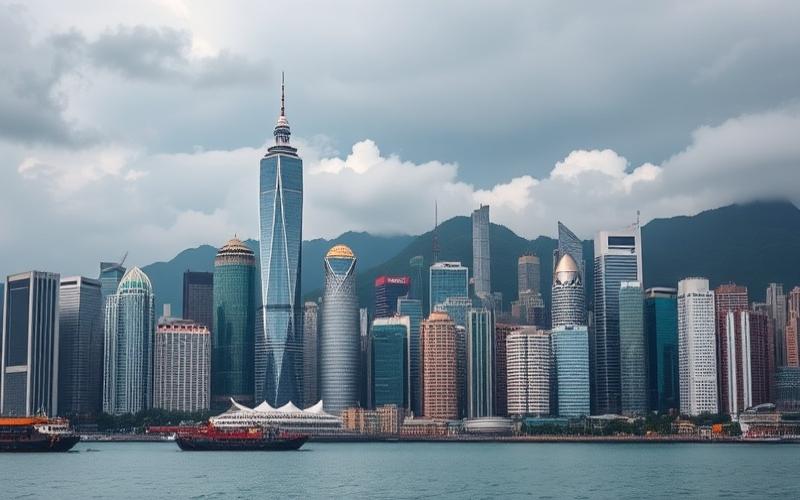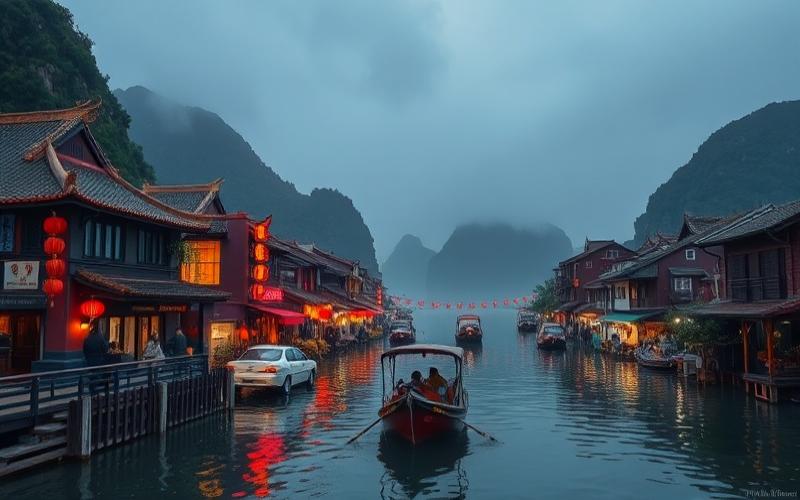
 Published on and written by Cyril Jarnias
Published on and written by Cyril Jarnias
In the shadow of Hong Kong’s skyscrapers, a unique opportunity is emerging: investing in its authentic villages which, despite their centuries-old history, hold unexpected economic potential. While the region’s rapid urbanization has often obscured these cultural gems, recent initiatives to revitalize these spaces offer new growth perspectives.
Villages like Tai O, famously nicknamed the “Venice of Hong Kong,” or the charming fishing village of Kat O, are on the brink of a transformation that could revitalize their local economies while preserving their rich and diverse heritage.
By exploring government incentives, ecotourism innovations, and business opportunities, this article delves into an evolving investment landscape, making the dream of combining profit and cultural preservation a tangible reality by 2025.
The Benefits of Investing in Rural Real Estate in Hong Kong
Investing in rural real estate in Hong Kong offers distinctive advantages, both in terms of quality of life and financial prospects, as well as sustainable development.
Key Benefits of Investing in the Countryside:
- Tranquility and Natural Setting:
- Rural areas offer a superior quality of life, characterized by a peaceful environment, lower density, and distance from urban stress.
- The Hong Kong countryside provides direct access to nature (hills, trails, traditional villages), ideal for those seeking calm and authenticity.
- Growing Appeal Linked to New Trends:
- Demand for authentic and sustainable experiences is rapidly increasing.
- Both local and international families now favor the New Territories for their more spacious homes, healthy environment, and expanding infrastructure.
| Rural Asset | City (Central/Kowloon) | Countryside (New Territories) |
|---|---|---|
| Density | Very High | Low |
| Price per m² | >40,000 HKD/m² | More Accessible |
| Quality of Life | Stress/Strong Urbanization | Nature/Tranquility |
| Rental Potential | ~2–3% | Rising due to family/ecotourism demand |
Economic Outlook & Financial Appeal:
- The Hong Kong real estate market anticipates a 20% increase in new home sales by the end of 2025, driven by lower interest rates.
- Prices are expected to rise by approximately +3% in the second half of 2025 due to limited land supply.
- Long-term appreciation in areas accessible by public transport remains strong; rapid infrastructure development in the New Territories also supports this potential.
Tax Incentives & Government Support:
- National policies currently aim to revitalize the real estate sector through:
- Planned large-scale renovation in urban/rural villages
- Easier access to credit for eligible projects
- Recent reduction in mortgage rates (-0.5%), significantly lowering real estate financing costs
- These measures directly benefit investors looking to participate in rural redeployment.
Opportunities Linked to Rural Tourism & Ecological Initiatives:
List of opportunities:
- Accelerated development of green tourism, with the creation of sustainable accommodations targeting local/international visitors seeking cultural immersion or outdoor activities.
- Continued growth in eco-friendly construction meeting current societal expectations for reduced carbon footprint.
- Supported projects promoting local food circuits/agritourism.
Forecast: these trends are expected to strengthen until 2025, positioning rural real estate as a key lever for combining stable financial returns with positive impact on the local environment.
⚡️ Hong Kong’s rural real estate thus combines residential tranquility, financial appeal enhanced by recent public policies, and strong potential linked to tourism and ecological shifts.
Good to Know:
Investing in rural real estate in Hong Kong offers notable advantages, emphasizing tranquility and a superior quality of life compared to hectic urban living. With growing demand for authentic and sustainable stays, these rural areas hold attractive growth potential. The government also supports these investments through tax incentives and development programs aimed at revitalizing rural areas. In 2023, economic forecasts indicate a significant increase in interest for rural tourism and ecological initiatives, thereby strengthening the financial potential of these investments. Authentic villages can become sought-after destinations for visitors eager to discover the unique charm of Hong Kong’s nature, paving the way for lucrative development opportunities in the real estate and tourism sectors.
The Authenticity and Heritage of Hong Kong Villages
The authenticity and heritage of Hong Kong villages constitute an essential cultural and historical wealth for the region. These villages, mainly located in the New Territories, embody a way of life inherited from the past, blending agricultural traditions, ancestral fishing, and clan organization.
Cultural and Historical Importance:
- Fortified villages like Kat Hing Wai or Tsang Tai Uk testify to the defensive ingenuity of local clans (Tang, Tsang), with their thick blue brick or granite walls, cannon towers, and unique access gates. They are remnants of an era marked by clan rivalries and the need to protect against bandits or wild animals.
- The Hakka village of Lai Chi Wo, founded in the 18th century by migrants from the north, still preserves traditional architecture (glazed tile roofs, metal-barred windows) as well as feng shui elements integrated into the village layout.
- The Ping Shan Heritage Trail, dotted with renovated historical buildings and a museum dedicated to the 500-year-old Tang clan, offers an immersive journey into ancient village culture through its ritual architecture.
- Ancient trails like the Tung O Ancient Trail traverse centuries-old hamlets where traditional agriculture or coastal fishing trades endure.
| Village | Heritage Specificity | Influence on Regional Identity |
|---|---|---|
| Kat Hing Wai | Fortified Tang Village; Thick Walls | Symbol of Traditional Clan Power |
| Tsang Tai Uk | Preserved Hakka Stronghold | Hakka Architectural Heritage |
| Lai Chi Wo | Hakka Architecture & Feng Shui | Living Memory of a Vanished Rural Way |
| Tai O | Stilt Houses | Cultural Emblem of the Tanka Fishermen |
Preservation & Conservation:
Notable efforts are being made by both the government and private organizations to restore these sites: scheduled restoration of old houses in Lai Chi Wo; regular renovation on the Ping Shan Heritage Trail; official heritage protection status for some emblematic architectural ensembles.
Cultural circuits also allow local and foreign visitors to appreciate these traditions while supporting their economic valorization.
List of Recent Initiatives:
- Approved restoration of 14 old houses in the Hakka village Lai Chi Wo
- Participatory creation/management of the Ping Shan Heritage Trail around historical buildings
- Regular organization of educational guided tours
Investment Opportunities Linked to Preservation:
- Preservation = added real estate value: attracting cultural tourists sensitive to unique heritage
- Limited but targeted development: traditional accommodations/artisanal restorations generating local jobs
- Opportunities for responsible investments focused on sustainable tourism
Challenges Facing Modernization:
Hong Kong villages must balance:
- Increasing urban pressure tending towards rapid demolition/reconstruction;
- Rural exodus causing human desertification;
- Financial difficulty linked to high maintenance/restoration costs;
This poses a dilemma between strict maintenance of original character (sometimes unprofitable) versus partial adaptation (risk of identity dilution). This context directly influences strategic investment choices:
List – Factors Influencing Decisions:
- Potential profitability versus regulatory constraints linked to heritage classification
- Tourist appeal depending on the actual degree of “authenticity” preserved
- Increased sensitivity to local expectations regarding social/cultural respect in any commercial project
The balance between authentic preservation and controlled development remains crucial to ensure the living – rather than museumified – transmission of Hong Kong’s rich rural heritage while generating sustainable economic benefits.
Good to Know:
Hong Kong villages, such as Tai O and Lai Chi Wo, represent important sites for preserving the region’s cultural and historical heritage, perpetuating centuries-old traditions and a distinct rural way of life. Their unique architectures, traditional festivals, and practices like ancestral fishing and agriculture contribute to Hong Kong’s regional identity. Conservation efforts, led by the government and local organizations, aim to maintain these heritage treasures against modernization pressures, while creating investment opportunities. However, integrating new infrastructure must be done carefully to preserve their authenticity, a major challenge for potential investors seeking to respect this delicate balance.
Why Underestimated Villages Offer Unique Opportunities
Unique Investment Opportunities in Hong Kong’s Underestimated Villages
Underestimated villages in Hong Kong represent singular opportunities for investors seeking both profitability, authenticity, and sustainable value.
Cultural and Historical Wealth
- These villages offer immersion in Hong Kong’s traditional narrative, with heritage architectures, centuries-old fish markets, and a lifestyle inspired by indigenous communities.
- For example, Lei Yue Mun retains its fishing village character while offering a renowned local culinary experience.
- Ma Wan (Park Island), once a traditional island community, now blends historical remnants with modern ecological initiatives.
Authenticity and Community Spirit
Investors find an environment where authenticity is not a marketing argument but a daily reality: strong intergenerational relationships, local solidarity facing contemporary challenges.
The community spirit attracts those wishing to move away from the standardized urban model to bet on human connection and social bonds.
Concrete Examples:
| Village | Distinctive Assets | Investor Testimony |
|---|---|---|
| Lei Yue Mun | Preserved waterfront, traditional markets | “Rental demand has doubled since I renovated my house while respecting the original architecture.” |
| Ma Wan | Calm beaches, absence of dense urbanization | “Green tourism is exploding thanks to nature trails. My seasonal rentals are fully booked 8 months/year.” |
| Siu Sai Wan | Urban proximity but village atmosphere | “Ideal for young families seeking calm without sacrificing mobility to Central.” |
Sustainable Development & Ecological Initiatives
Several projects favor ecological renovation or eco-responsible construction (local solar panels on Ma Wan; reasoned management of maritime resources at Lei Yue Mun).
Tourism development emphasizes respect for natural heritage: marked trails rather than large hotel complexes.
Potential Advantages for the Committed Investor:
- Priority access to certain regional calls for projects dedicated to rural tourism or eco-responsible housing.
- Enhanced image with a clientele sensitive to environmental issues.
Valorization of Rural Tourism
The rise of experiential tourism encourages the discovery of authentic places far from classic circuits. Alternative accommodations (renovated traditional houses) meet strong seasonal demand.
Concrete Example:
An investor who restored several heritage houses in Lei Yue Mun notes “an annual occupancy rate above 85%, driven by word-of-mouth about the local charm.”
Institutional Support and Tax Incentives
Hong Kong local authorities are implementing:
- Targeted tax relief for less dense rural areas
- Administrative support for heritage-related procedures
- Occasional subsidies promoting green renovation or creation of sustainable tourism activities
Summary of Competitive Advantages:
| Criterion | Underestimated Village | Classic Urban Neighborhood |
|---|---|---|
| Long-term Appreciation Potential | High due to catch-up/scarcity | Already high/stagnant |
| Rental Profitability | Possible strong seasonality | Stable but low growth |
| Authenticity/Experience | Unique | Standardized |
| Public Support | Specific/Dedicated | Generic |
Key Takeaway: investing in an underestimated village not only allows diversifying one’s real estate portfolio but also betting on the future sustainably while actively contributing to preserving Hong Kong’s cultural identity.
Good to Know:
Investing in Hong Kong’s underestimated villages offers unique opportunities thanks to their cultural and historical wealth, rooted in traditional narratives and indigenous lifestyles. These authentic villages captivate investors seeking new perspectives, where community spirit plays a central role. With potential for sustainable development and ecological initiatives, they become attractive hubs for rural tourism. Support from local authorities, coupled with tax incentives, makes these opportunities particularly appealing in a long-term strategy. Examples such as Tai O, renowned for its picturesque ambiance and unique stilt houses, or Peng Chau with its exquisite landscapes, well illustrate the testimonies of investors happy to have bet on these singular characteristics to succeed in their projects.
Strategies for Successful Real Estate Investment in Hong Kong
Analysis of the Real Estate Market in Hong Kong’s Authentic Villages
The real estate market in Hong Kong, including in authentic villages and rural areas, is experiencing a reversal after several years of significant price declines. For 2025, a price increase of up to 10% is anticipated under the combined effect of economic recovery, recent interest rate cuts, and government measures to facilitate access to real estate credit. However, demand remains heterogeneous depending on location: some rural auctions found no takers in early 2024, reflecting variable attractiveness depending on the potential of the considered village or neighborhood.
| Trend | Situation Early 2024 | Forecast for 2025 |
| Average Price | Decline (up to -30%) | Expected Increase (up to +10%) |
| Transaction Volume | Low | Gradual Recovery |
| Rural Attractiveness | Selective | Growing |
Tips for Identifying Profitable Investment Opportunities
- Stay informed about local urban projects: development of rapid transport or new shopping centers increases real estate value.
- Monitor regulatory changes, particularly mortgage granting conditions or modifications to the urban plan.
- Prioritize sectors where urbanization remains controlled but access to Central/Kowloon is improving.
Pre-purchase checklist:
- Examine the local urban plan.
- Verify the legality of land status (e.g., “Small House Policy” titles).
- Consult a local land law expert.
Cultural and Historical Specificities Influencing Value
Authentic villages are distinguished by their clan history (Hakka/Cantonese villages), architectural heritage (ancestral stone/wood houses), and preserved natural environment. These factors can increase appeal to:
- Expatriates seeking authenticity and tranquility,
- Local families valuing their roots,
but sometimes require strict adherence to heritage rules that may limit certain modern developments or renovations.
Examples:
| Village | Cultural Specificity | Impact on Value |
| Tai O | Stilt Houses | Strong tourist appeal, rapid appreciation if carefully renovated |
| Sai Kung | Hakka Heritage | Dynamic market among expatriates/affluent families |
Adapted Financing Strategies
Hong Kong banks have relaxed their criteria since late 2024 with:
- Lower down payments possible for certain property types,
- Competitive fixed rates but caution due to strict documentation requirements for atypical village properties,
- Possibility to obtain financing through specialized companies familiar with the local rural/village context.
Tip: always compare multiple bank offers and include a budget margin for unforeseen renovations, frequent in these areas.
Case Studies / Concrete Examples
- LOHAS Park/Tseung Kwan O South: Off-plan purchase in periphery transformed thanks to adjacent commercial development (+25% in five years).
- Ma Wan/Park Island: Highly sought-after waterfront units despite limited island access; strong premium due to local scarcity.
- Real case: Purchase without detailed inspection near Sai Kung leading to six additional months/unexpected cost increases linked to marine corrosion — highlighting the crucial importance of prior technical diagnosis.
Common Mistakes Observed:
- Neglecting legal control of land status
- Underestimating the real cost of necessary renovations
Best Practices:
- Use a specialized agent thoroughly familiar with each local constraint
- Anticipate all ancillary costs (legality of water/electricity connections)
Involvement of Local Communities and Impact on Valorization
Active involvement in village associations often facilitates social integration AND administrative acceptance of the real estate project:
- Advantages:
- Easier access to unofficially published information
- Help with local administrative procedures
- Avoided Risks:
- Potential conflicts with neighbors/problems linked to un-respected ancestral customs
A participatory approach generally fosters better community perception, thus potentially accelerated revaluation upon future resale.
Recommended Resources & Local Experts
Indicative list:
- Real estate agents specialized in “villages”;
- Legal firms experienced in “Small House Policy/customary law”;
- Certified local artisans for heritage renovation;
Useful tools:
- Web platforms listing rural sales & recent owner reviews
- Public meetings organized by village councils
Good to Know:
To succeed in real estate investment in Hong Kong’s authentic villages, it is crucial to analyze current market trends and forecasts for 2025, which indicate growing demand for this type of property due to renewed interest in historical and cultural areas. Investors should stay informed about local development and monitor regulatory changes that may affect real estate values. Knowing the cultural and historical specificities of villages helps understand how these can add unique value to properties. Adapted financing strategies, considering Hong Kong’s economic conditions and bank policies, are also essential. Case studies of successful investments demonstrate that involvement of local communities can significantly influence property valorization. It is recommended to surround oneself with local resources and experts to maximize success chances, while avoiding pitfalls of real estate investments in these specific areas.
Disclaimer: The information provided on this website is for informational purposes only and does not constitute financial, legal, or professional advice. We encourage you to consult qualified experts before making any investment, real estate, or expatriation decisions. Although we strive to maintain up-to-date and accurate information, we do not guarantee the completeness, accuracy, or timeliness of the proposed content. As investment and expatriation involve risks, we disclaim any liability for potential losses or damages arising from the use of this site. Your use of this site confirms your acceptance of these terms and your understanding of the associated risks.


